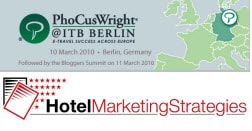The first day of the 2010 Association of Travel Market Executives conference has wrapped up and provided its audience of travel marketers with statistics, strategies and technologies to consider. The conference theme was “The New Now & The New Next”
What is Your Ideal Method to Book Leisure Travel?
This poll is designed to evaluate the most popular, IDEAL, method for booking leisure travel arrangements. The results will indicate the “Bookularity” of the preferred category comprising the booking method and type of travel seller that those surveyed feel provides the greatest value in the leisure travel reservation process for airline, hotel, car rental and attractions. The question for this week’s RockCheetah poll is “What is Your Ideal Method to Book Leisure Travel?”
Google Maps Hotel Prices: Fear & Loathing in Online Travel
Google’s announcement that it is testing the addition of the hotel price to Google Maps search results resulted in fear and concern within the travel community. Google appears to be testing the water on the Maps platform in preparation of launching the hotel price integration into the Universal Search results on all Google results pages. The end result is that advertisers will be able to link more directly and deeply to relevant content from a search results page.
Who Will Win the Merchant Hotel Room Occupancy Tax Battle?
The American Hotel & Lodging Association (AH&LA) held its annual Legislative Action Summit following receipt of an open letter drafted by five major travel associations requesting support of proposed legislation that would eliminate room occupancy tax assessments on merchant model hotel room transactions processed by online travel companies. With millions of dollars at stake, the question for this week’s RockCheetah Weekend Poll is “Who Will Win the Merchant Hotel Room Occupancy Tax Battle?”
Bathing in the Hotel Merchant Tax Quagmire
The hotel merchant tax issue is creating havoc for online travel agencies. At the present time, more than 200 municipalities, counties and states have lawsuits pending in an attempt to claim additional tax revenues based on the markups applied by Online Travel Agencies (OTAs.) In some cases, the suits are groundless as the current hotel occupancy tax laws are based on the revenue received by the hotel. However, some cities are changing their tax laws to base the taxes on the retail price paid by traveler. Unfortunately, there is widespread confusion – this article attempts to provide clarity on the key issues and a recommendation for resolving the hotel merchant tax problem.
Travel Industry Site Traffic Rebound – Not a Hotel Slam Dunk
Compete produced an analysis that indicates traffic to hotel brand and Online Travel Agency hotel specific web pages have increased faster than airline and car rental sectors, indicating a faster path to recovery. Unfortunately, the increase in site traffic has not translated to improved hotel performance as hotels continue to deeply discounting their product to shift market share from competitors. As the hotels fight to support occupancy and average rate, share of leisure travel bookings is shifting away from hotel brand sites to the OTAs.
With the steepest drop in US hotel net operating income on record and non-performing Commercial Backed Mortgage Securities hotel loans hovering close to 15%, the US hotel industry appears to be preparing for a difficult stretch that will continue to provide travelers with excellent hotel values, but test the patience and wallets of hotel owners.
Smarter Travel Agents and Travel Agencies Rise from the Ashes
The travel agency community has sustained significant losses due to consolidation and the economic downturn. A new breed of smarter and more innovative travel agencies have emerged that understand customer needs, provide specialized travel product knowledge, and creating travel plans best fit those needs. These are the traditional traits of quality travel agencies. The difference is that these new agents have embraced technology and used it to expand their reach, engage their customers and grow their revenues.
How Google Can Help Simplify Online Travel Planning
The planning phase of the seven-step travel process is a hot area for travel startups that are developing innovative solutions to address a complex problem. Google, with 70+% share of US search traffic and many existing travel planning tools is perfectly positioned to improve and simplify the travel planning process. In the future, end-to-end planning of complex travel arrangements will result from enhanced profiles supporting trip-centric traveler personas and geo-aware itinerary sequencing tools. The introduction of hard and soft filtering will provide support for emerging Web 3.0 technologies capable of providing more relevant travel product recommendations.















